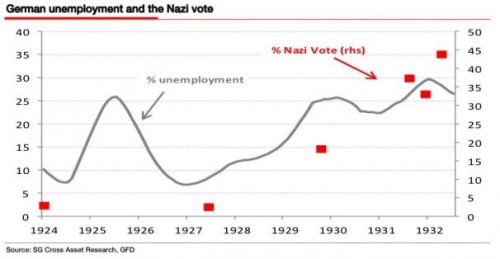Neo Nazi ‘Golden Dawn’ Party Garners Seats in Greek Parliament
Greek election polls are trickling in and one disturbing result is this: The Neo-Nazi ‘Golden Dawn’ party, whose logo is practically a swastika, is likely going to get enough votes to win a few seats in parliament. Nothing is quite confirmed yet, but that’s what exit polls show now.
They’ll be tiny, but it’s still a shock.
And furthermore, the relationship between depression, unemployment, and Nazis repeats again, as this famous chart from SocGen’s Dylan Grice confirms.














